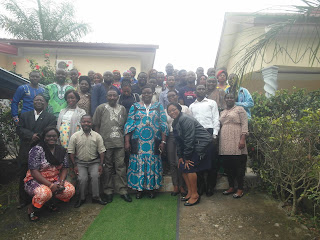Wednesday, July 18, 2018
CAMEROON LINK PARTICIPATES IN ANTI-RETROVAL DISPENSATION WORKSHOP
By James Achanyi-Fontrm, Coordinator
Cameroon Link participated in the national workshop organised in Mbalmayo from the 9th to 13th July 2018 by the National Committee for dispensation of ARV drugs in the Health District od ABO. The workshop covered the following issues: STOCKS MANADEMENT, THÉRAPEUTIC ÉDUCATION , PSYCHO SOCIAL FOLLOW UP, DISPENSATION OF Anti-retroval DRUGS AND FILLING OF DATA BASEDOCUMENTS.
This article presents the global look of the content of the training which covered the the Context, justification, the Objectives, Résults awaited and methodology of actions. The context and justification were:
Dans le cadre de l’accélération de la thérapie antirétrovirale, le Cameroun a mis en place des PODIC (point de distribution communautaire) des ARV pour améliorer la rétention des PVVIH au traitement antirétroviral
- 72 OBC sont en lien avec 54 FOSA sur les 77 retenues, un total de 283 acteurs formés dont 75% d’acteurs communautaires dans le cadre de la dispensation communautaire des ARV.
- La file active orientée vers les OBC s’élève à 7 635 PvVIH sur 25 372 PvVIH attendus soit 3% de la file active nationale en fin décembre 2017.
- Passage à échelle à travers le recrutement de 26 nouvelles OBC pour la période 2018-2020.
A cet effet, il est prévu le renforcement des capacités des prestataires communautaires et des prestataires de santé dans le souci de faciliter la collaboration entre agents de santé des FOSA tutrices et acteurs communautaires
OBJECTIVES
Doter 56 membres et responsables de Groupes de Soutien/Association des PVVIH/OBC et FOSA des capacités nécessaires à la dispensation communautaire des ARV et au remplissage des registres et mettre en réseau les CTA/UPEC tuteurs avec les OBC formées.
De manière spécifique:
Renforcer les capacités des nouvelles OBC et FOSA sur les généralités du VIH ;
Former les membres et responsables de groupes de soutien/Association des PVVIH/OBC en gestion de stocks,
Renforcer les capacités des nouvelles OBC et FOSA à l’éducation thérapeutique, accompagnement psycho social, Causerie éducative, groupe de parole, soutien à l’observance;
Former les nouvelles OBC sur la dispensation des ARV et le remplissage des outils.
RESULTS AWAITED
Au terme de la formation :
les nouvelles OBC et FOSA sont formées sur les généralités du VIH ;
Les membres et responsables de groupes de soutien/Association des PVVIH/OBC sont outillés en gestion de stocks,
les capacités des nouvelles OBC et FOSA à l’éducation thérapeutique, accompagnement psycho social, Causerie éducative, groupe de parole, soutien à l’observance sont renforcés;
les nouvelles OBC sont formées sur la dispensation des ARV et le remplissage des outils.
METHODOLOGY
Le manuel de formation sera distribué aux apprenants/membres et responsables de groupes de soutien/Association des PVVIH/OBC et pharmaciens des CTA/UPEC.
Des présentations seront faites dans le but d’expliquer l’intérêt de la formation et le mécanisme de dispensation communautaire du TARV.
Des exercices pratiques seront donnés aux apprenants pour mettre en application les stratégies reçues tant pour la dispensation que pour le remplissage du registre TARV.
Dispensation of anti-retroviral by Community Based Organisations
By James Achanyi-Fontem, camlink News
The first module of the training was on the generalities of HIV/AIDs and the concept of logistic. Paticipans defined what HIV means, the different types of drugs used to fight the virus and what a treatment protocole means. A video was projected to show how the virus affects the body and its consequencies.
It was noted that the treatment with the anti-retroviral only reduces the effect of the virus in the body and does not eliminate it. It clears the viral load in the blood, especially when it is non-detectable. The anti-retroviral re-establishes and preserve the immunological functions, which is the CD4 in the blood stream. This helps to improve the well-being of the patient and reduces mortality.
The standard anti-retroviral protocol is the mono or bi-therapy tablets for treatment and these results to rapid recovery by increasing resistance to the multiplication of the effects of the virus in the body. The treatment is composed of the following:
INTI + 1 INNTI : or any of the four combinations associated
Zidovudine + Lamivudine+ Efavirenz
Zidovudine + Lamivudine + Névirapine
Ténofovir + Lamivudine + Efavirenz
Ténofovir + Lamivudine + Névirapine
The above drugs have principal side effects which need to be taken into consideration:
ZIDOVUDINE (AZT) may lead to severe anemia Anémie, neutropénie, nausées, vomissements, myalgie, fatigue, insomnie, hyper pigmentation (ongles, langue), gynécomastie. In this case it is advised to contrôl NFS for research of the cause of anémia and/or neutropénie.
LAMIVUDINE (3TC) may lead to Céphalées/insomnie, diarrhée, with some rare cases of neuropathie périphérique. In this case, toleration is generally recommended.
Using TENOFOVIR (TDF) may lead to Diarrhées, nausées, flatulences, tubulopathie proximale, néphrotoxicité SD de Fanconi and it is advised to evalulate the patient ; renal function,,and adapte the posology with créatinine < 50ml/mn.
NEVIRAPINE (NVP) will lead to rashes cutané that could evaluate towards a syndrome of Stevens-Johnson et Lyell. reactions very frequent in women with CD4 totaling >250 cell/mm3 and >400 cell/mm3 in men. With this, the following effects have been recorded and it is advised to always administer half the dose in the first six months. In case of effects, within 7 days,return patient to clinic of observation of CD4 count. Aaaaaaaaaaaaaaaaaaaaaaaaaaaaaacd4 count is generally 250 for women and 400 for men.
EFAVIRENZ (EFV) will show the following effects: T neuropsychiques roubles,dowsiness, insomnie, somnolence, hallucination, possible toxicity cutanée et hépatique. In this case, take medicine to reduce effects in pregnant women and patient suffering from antécédents psychiatriques and convulsions. When in difficulties, contact your care-giver and doctor.
Subscribe to:
Posts (Atom)



